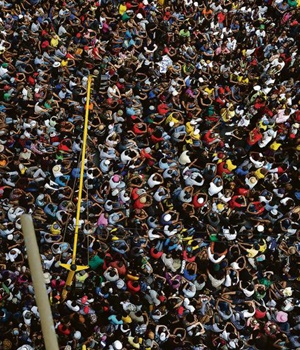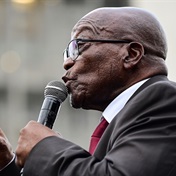
The student uprisings about university fees mark yet another chapter in the seepage of power through the ANC’s hands, writes Mondli Makhanya
The imagery and symbolism were powerful. The gates of Parliament were falling. The heavy double doors of the National Assembly remained firmly shut and shielded by police.
Suited politicians inside the chamber continued with business as usual, oblivious to the sounds of stun grenades going off in the precinct. A seemingly tone-deaf finance minister, Nhlanhla Nene, proceeded with his austerity budget speech, barely acknowledging the cries outside.
Presiding officer Thoko Didiza told MPs they should leave the chamber through the side door “because there are still people outside”. ANC parliamentarians united with their archrivals to defeat an Economic Freedom Fighters (EFF) proposal that the budget speech be postponed because of the urgency of the fee protests. Higher Education Minister Blade Nzimande tried to address the masses from behind a fence, only for his megaphone to fail.
And there was the ubiquitous figure of the intelligence minister.
Then there was ANC secretary-general Gwede Mantashe refusing at first to come down from an elevated stage outside Luthuli House to receive the students’ memorandum at street level.
Mantashe’s alliance partners Sdumo Dlamini of Cosatu and Solly Mapaila of the SA Communist Party stood with him looking down at the sea of angry students. Student leader Mcebo Dlamini, sacked by Wits University management a few months ago, had returned to command the uprising.
Dlamini ordered Mantashe to “humble himself” and come down into the street. Mantashe signalled that the student leaders should come to him. He was soon defeated in this war of wills and bowed to Dlamini’s instructions. Young women in the student leadership were telling the old patriarchs of the liberation movement what to do.
Again, we saw the ubiquitous figure of the intelligence minister.
On Friday, South Africa awoke to scary images of an intimidating wire fence and an iron wall of policemen and heavy security equipment around the Union Buildings, the seat of the democratic government.
Throughout the day, there were TV images of students pushing down the fence and cutting holes through it in a desperate bid to convey their message to those cloistered inside that imposing building.
There was billowing smoke as students burnt tyres and public toilets as though they were sending smoke signals to the leadership.
And there was the ubiquitous presence of the intelligence minister.
We saw political leaders being chased away by students who would have none of their political opportunism. This revolution was not for sale, so “voetsek and f**k off” they were told.
From Thohoyandou to Polokwane to Johannesburg to Pietermaritzburg to Durban to East London to Alice to Grahamstown to Port Elizabeth to Cape Town to Stellenbosch to Kimberley, the fires raged this week. They were physical fires and fires of rage in the bosoms of angry youths.
And lurking in the shadows was the ubiquitous figure of the intelligence minister.
The most enduring of the images, the ones that will live beyond this rebellion, were those inspired by the #FeesMustFall hashtag. They were #CapitalismMustFall, #ColonialismMustFall, #ExploitationMustFall, #RacismMustFall and many more.
By Thursday, there emerged the one that would send a chill down the spine of the ubiquitous intelligence minister who was already petrified by events: #BladeMustFall; #ANCMustFall; #ZumaMustFall.
It was inevitable, given the atrocious political handling of the crisis that, at some point, the protest would move beyond demands for access to education to demands for the political order to fall.
From the time the protests began on the campus of Wits University, it was a fire that had been lit.
The students tasted power when they detained vice-chancellor Adam Habib, forcing him to sit on the floor and share brown bread with them.
They forced the university council to work a 72-hour weekend and be at their beck and call. Looking on, their counterparts throughout the country were emboldened.
By Monday, when government and vice-chancellors came up with the 6% compromise, it was too late. The power game had changed and the elders were no longer in charge. The demand was 0%, and by the middle of the week it had morphed into free tertiary education.
By the end of the week, it was the fall of the political and economic order that the students believed was responsible for their poverty and alienation.
Many comparisons have been made between this uprising and previous student-led turning points in history. The generation we saw on the streets has been compared with others that spearheaded change – the 1944 ANC Youth League founding generation, the 1969 SA Students’ Organisation generation, the 1976 Soweto generation and the 1980s generation.
But these are simplistic comparisons. It is a different time with a different set of challenges. Where previous uprisings and phases of uprisings were against a pernicious system, today’s struggles and uprisings are about the stubborn institutionalised injustice and inequality that was cemented by apartheid.
These struggles are being fought on many fronts. They are fought by unions on the shop floor and in the political arena, by civil society and faith groups, by lobby groups who seek to influence policy and by the government itself through various interventions.
But the ineffectiveness and limited impact of many government interventions – despite a R1.3 trillion budget and excellent infrastructure – has seen power seep through its hands.
Communities have taken the initiative for policy and governance away from government and the ANC by dictating the type and pace of service delivery through mass (and often violent) protests.
Business is dictating the pace of change by implementing tick-box compliance to transformation or not doing anything at all. It is dictating economic direction by exploiting the vacuum left by weak authority.
Unions dictate the war on poverty through often unsustainable wage demands and militant action. The political agenda is being dictated by Julius Malema’s 6% EFF, forcing the 62% ANC into permanent reactive mode.
The nation’s moral code is being directed from various sectors of society as the governing party flatly refuses to rise above the ethical shortcomings of some of its senior leaders.
The student uprisings are yet another chapter in the fall of the power of the governing ANC. In the past week, the students have reminded the ANC of its unfulfilled 2007 Polokwane national conference resolution – reiterated in 2012 in Mangaung – that free tertiary education would be phased in.
The initiative has now been taken over by the students, who are not only dictating the terms of education funding but also the pace and nature of the transformation of the higher education sector.
This uprising may not be the beginnings of a revolution the romantics believe it is and the securocrats fear it is. The government will not fall, but its power will continue to decline until its authority is a hollow shell.
In situations like these, the strongmen shore up the regime’s lack of authority through force. We saw it this week.
Hence the ubiquitous presence of the intelligence minister




 Publications
Publications
 Partners
Partners








